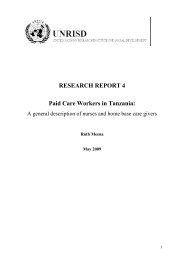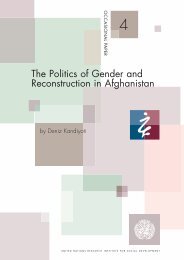Women's Employment - United Nations Research Institute for Social ...
Women's Employment - United Nations Research Institute for Social ...
Women's Employment - United Nations Research Institute for Social ...
Create successful ePaper yourself
Turn your PDF publications into a flip-book with our unique Google optimized e-Paper software.
Gender and employment in Moroccan textile industries<br />
as the level of wages is concerned. This approach also has its limits,<br />
as wage discrimination is explained only by the situation of women<br />
in their households, ignoring how gender differences are experienced<br />
in the factory and the impact this has on discrimination against<br />
women.<br />
The present study looks at gender relations both in the household<br />
and in the factory and the way in which these determine gender<br />
discrimination in the labour market (Humphrey, 1987). In other words,<br />
it explores how gender relationships are experienced and perceived<br />
both in the family and at work. It hopes to demonstrate how gender<br />
hierarchies, which have been firmly established by society, are<br />
extended and maintained in the factory. Moreover, since factories<br />
themselves are not monolithic in terms of employment practices and<br />
production methods, the chapter also attempts to compare women’s<br />
experiences in different sectors of the textile export industries.<br />
The woman worker is caught up in power relationships which<br />
determine her position in the hierarchy of the factory and the<br />
negotiation of her wages. One could deduce from this a relationship<br />
of total exploitation and obedience, with the woman worker in a<br />
situation of total dependence, at the service of the factory and with<br />
no bargaining power. But this would be to simplify the complexity of<br />
the strategies used both by the factory and by the women workers to<br />
maximize their benefits and preserve their interests. In other words,<br />
it would underplay the role of human agency.<br />
The scope of negotiation available to actors in organizational<br />
contexts has been explored by Crozier and Friedberg (1977). While<br />
acknowledging that power relationships operating within<br />
organizations favour some to the detriment of others and that the<br />
powerful obtain greater advantages <strong>for</strong> themselves, they argue that<br />
power can be exerted by the less powerful individuals through actions<br />
that are unpredictable (breaking established norms and rules) or by<br />
refusing to concede to demands. This model needs to be refined to<br />
grasp the reality of women workers in Moroccan factories, which are<br />
organized so as to restrict workers’ scope <strong>for</strong> bargaining. It is the<br />
organization that makes the rules, establishes the division of work<br />
and fixes the wages. The use of individual strategies depends on the<br />
position of the actor in the system, her resources and constraints. The<br />
rationality and behaviour of women workers is shaped and, indeed,<br />
limited, by their position in society and in the factory.<br />
This chapter argues that unequal gender relations within the<br />
family and the society are carried into the factory and reproduced<br />
there. Gender subordination functions throughout the employment<br />
63
















